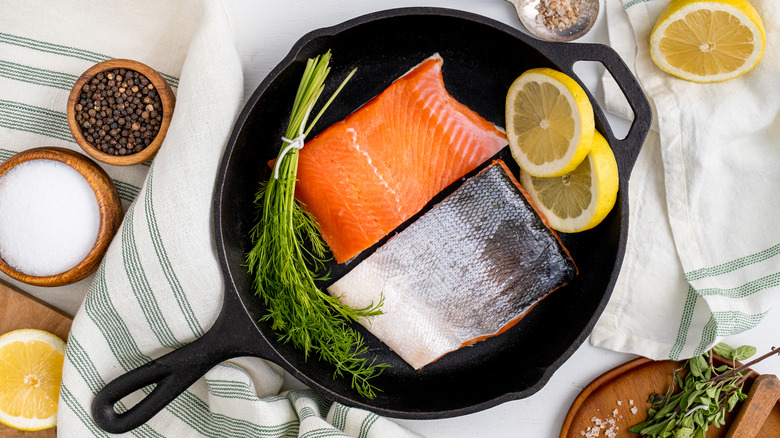How To Cook Less 'Fishy' Salmon
Americans love salmon, whether they're leaping up waterfalls or gracing cedar planks. The National Oceanic and Atmospheric Administration (NOAA) reports that the average American ate nearly 3 pounds of salmon per year in 2018, and it's easy to understand why: It's meaty and tasty; the vitamin B, selenium, and omega-3 content is through the roof, according to Healthline; and the NOAA assures us that there are plenty of fish in the sea for our next seafood dinner because United States salmon fisheries are healthy and well-regulated.
We love salmon so much we've named a color after their flesh — which comes from the fish's diet (or dye if it's farmed), reports Time. But let's face it, salmon serves up something not every eater enjoys: a fishy flavor. As a fatty, oily fish like tuna and mackerel (versus a mild white fish like cod or perch, per Healthline), this taste can be off-putting to some palates. Fortunately, there are several ways to tone it down during preparation and cooking to ensure you can keep enjoying this popular pink seafood.
Where salmon's fishy smell comes from
The first step in mitigating fishiness is to make sure you choose the best quality salmon available and carefully cut out the dark bloodline, which packs an extra punch of fishy flavor, per Medium. The similarly strong-tasting gray material you see on cooked salmon is actually a layer of fat between the filets and the salmon's skin, according to a Komo News interview with Dr. John Swartzberg. Swartzberg added that though this fat is edible and high in omega-3s, it may have more concentrations of toxins — especially if the salmon was farmed and not wild – and it'll probably taste fishier. But what causes that fishy flavor, anyway?
Ocean fish, as reported by Yahoo! News, contain an amino acid called trimethylamine oxide (TMAO) so their cells can handle life in saltwater. Once fish die, however, TMAO turns into trimethylamine (TMA) — and that's what causes the fishy smell and therefore, the fishy taste. Yahoo! News explains that less fresh fish will smell stronger, but you can address the odor by cleaning the meat. Make sure you rinse very briefly and pat it dry, says Insider – oversaturated fish can lose that perfect flakiness you're aiming for. Also, be sure to sanitize your kitchen after washing fish and other raw meats because of the risk of bacterial contamination, warns the United States Department of Agriculture.
How to make the best salmon
There's a good reason why your classic British fish and chips platter always comes with lemon wedges, malt vinegar, or both. Yahoo! News reports that acids temper TMA, keeping its odiferous molecules from getting into your nostrils — and that's why many fish dishes call for citrus, tomatoes, or vinegar to be added during cooking or served as condiments. (Plus, it just tastes good.)
America's Test Kitchen writes that incorporating a sugary element, like miso or honey, also helps in this department — as does chargrilling your salmon outdoors, with the added benefit of not filling your living space with that telltale TMA aroma. Furthermore, America's Test Kitchen explains, you can make burger patties with your salmon and include myriad acidic add-ins like capers and lime. The sky's the limit!
Salmon remains a steadfast foodie favorite in everything from sushi to salad. Baked or battered, there's nothing fishy going on here — you just need to take the time to prepare your protein with care and set it swimming in the right ingredients for a perfectly delicious seafood meal.


